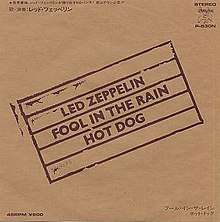Fool in the Rain
"Fool in the Rain" is the third song on Led Zeppelin's 1979 album In Through the Out Door. It was the last single released in the US before they formally disbanded in 1980. The song reached number 21 on the Billboard Hot 100 on February 16, 1980.
| "Fool in the Rain" | ||||
|---|---|---|---|---|
 Japanese single picture sleeve | ||||
| Single by Led Zeppelin | ||||
| from the album In Through the Out Door | ||||
| B-side | "Hot Dog" | |||
| Released | 7 December 1979 (US) | |||
| Recorded | November–December 1978 | |||
| Studio | Polar, Stockholm, Sweden | |||
| Genre | ||||
| Length | 6:08 | |||
| Label | Swan Song | |||
| Songwriter(s) | ||||
| Producer(s) | Jimmy Page | |||
| Led Zeppelin singles chronology | ||||
| ||||
| Audio sample | ||||
| ||||
Composition and recording
The song exhibits a Latin feel. The main section is in 12/8 meter; this section employs an unusual polyrhythmic groove, with the piano and bass playing six beats per measure and the melody (and parts of the drum kit) playing four beats per measure. The result is that most of the instruments appear to be playing quarter-note triplets against the swing of the melody and drum kit. Drummer John Bonham plays a shuffle beat similar to the "Purdie shuffle" rhythm, along with a samba-style breakdown and hop-skip riff arrangement.[2] A master drum track shows that the samba breakdown (2:25) was recorded separately.
Bassist John Paul Jones and vocalist Robert Plant developed the idea for the samba beat from watching the 1978 FIFA World Cup tournament in Argentina.[2]
Critical reception
While In Through The Out Door was not regarded with the same praise as Led Zeppelin's previous albums, "Fool in the Rain" still managed to garner positive reception.[3][4][5][6] Scott Ludwig, writing for Courier News in 1980, highly praised Bonham's drum playing.[7] In a retrospective review, Andrew Doscas of PopMatters called it the "standout track", opining it was "the band’s last fun song" and "the only such found on In Through the Out Door".[4]
Other renditions
"Fool in the Rain" was never performed live by Led Zeppelin as a band. Robert Plant teamed up with American rock band Pearl Jam in 2005 and performed the song for the Hurricane Katrina benefit in Chicago's House of Blues. Pearl Jam originally did not plan to perform the song, but changed their itinerary after Hurricane Katrina went through New Orleans. All proceeds of the performance went to charities.[8]
Chart history
Single
| Chart (1980) | Peak position |
|---|---|
| U.S. Billboard Hot 100[9] | 21 |
| U.S. Cash Box Top 100 Singles[10] | 31 |
| U.S. Record World The Singles Chart[11] | 34 |
| Canadian RPM Top 100 Chart[12] | 12 |
| New Zealand Top 50 Singles Chart[13] | 44 |
Single (Digital download)
| Chart (2007) | Peak position |
|---|---|
| Canadian Billboard Hot Digital Singles Chart[14] | 69 |
References
- Jon Bream (17 September 2010). Whole Lotta Led Zeppelin: The Illustrated History of the Heaviest Band of All Time. Voyageur Press. p. 222. ISBN 978-0-7603-3955-8.
- Dave Lewis (1994), The Complete Guide to the Music of Led Zeppelin, Omnibus Press, ISBN 0-7119-3528-9.
- Richardson, Mark (28 July 2015). "Led Zeppelin: Presence / In Through The Out Door / Coda Album Review". Pitchfork. Condé Nast. Archived from the original on 19 January 2018. Retrieved 5 July 2018.
- Doscas, Andrew (22 September 2015). "Led Zeppelin: In Through the Out Door (Deluxe Edition)". PopMatters. Archived from the original on 5 July 2018. Retrieved 5 July 2018.
- Reed, Ryan (13 August 2015). "Led Zeppelin: Presence, In Through the Out Door and Coda Reissue Reviews". Paste Magazine. Wolfgang's. Archived from the original on 20 April 2016. Retrieved 5 July 2018.
- Marszalek, Julian (28 July 2015). "Led Zeppelin: Presence, In Through The Outdoor, Coda (Reissues)". The Quietus. Retrieved 5 July 2018.
- "Zeppelin's Fury Continues". Courier News. 22 March 1980. p. 25. Retrieved 14 July 2018 – via Newspapers.com. (subscription required)
- Fischer, Blair (6 October 2005). "Pearl Jam, Robert Plant Unite Onstage". Rolling Stone. Penske Business Media. Archived from the original on 5 July 2018. Retrieved 5 June 2018.
- "Hot 100 Singles – 16 February 1980". Billboard. Archived from the original on 4 October 2013. Retrieved 17 January 2009.
- "Top 100 Singles – 23 February 1980". Cash Box. Archived from the original on 10 February 2009. Retrieved 17 January 2009.
- "Top 40 for 1980 – February 1980". Record World.
- "RPM Singles Chart – 23 February 1980". RPM. Archived from the original on 6 October 2012. Retrieved 15 January 2009.
- Scapolo, Dean (2007). "Top 50 Singles – February 1980". The Complete New Zealand Music Charts (1st ed.). Wellington: Transpress. ISBN 978-1-877443-00-8.
- "Hot Digital Singles – 1 December 2007". Billboard. Archived from the original on 8 September 2013. Retrieved 2009-01-17.